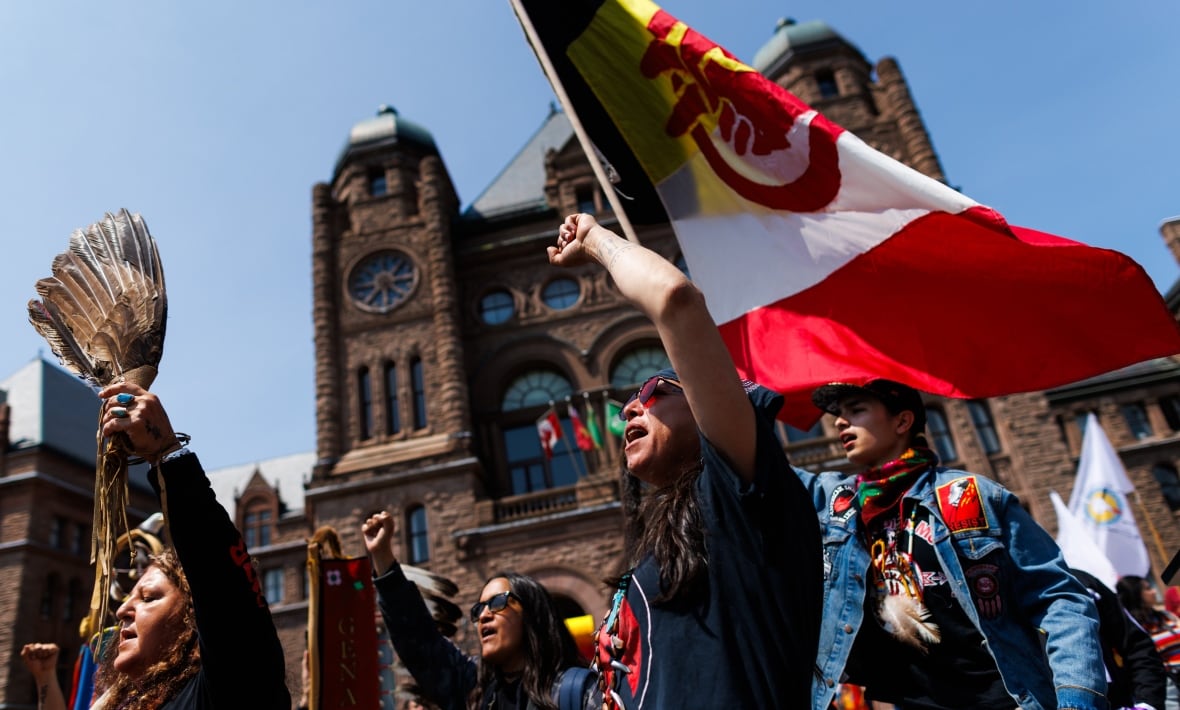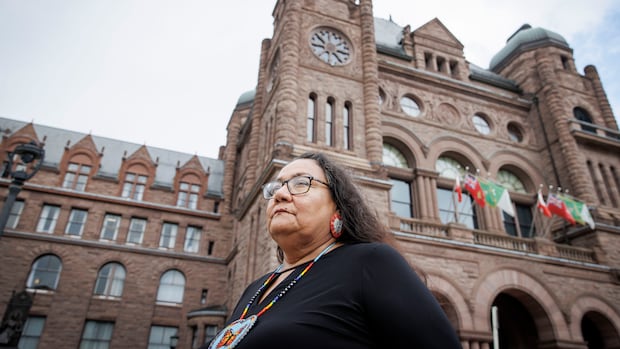Federal, provincial environmental bills have 'no respect' for Ontario First Nations, says chief
Ontario says it continues to consult with First Nations to build consensus
Nine Ontario First Nations asking for an injunction against a pair of federal and provincial bills meant to fast-track infrastructure projects took their message directly to Queen's Park on Wednesday.
The Indigenous communities said in the legal challenge filed in the Ontario Superior Court of Justice that the federal law known as Bill C-5 and the Ontario law known as Bill 5 both represent a "clear and present danger" to the First Nations' self-determination rights to ways of life on their territories.
Bill C-5 allows cabinet to quickly grant federal approvals for big projects deemed to be in the national interest such as mines, ports and pipelines by sidestepping existing laws, while Ontario's Bill 5 allows its cabinet to suspend provincial and municipal laws through the creation of so-called "special economic zones."
Speaking at a news conference in Queen's Park on Wednesday, Apitipi Anicinapek Nation Chief June Black said the First Nation communities have a "sacred responsibility" to protect the land.
"What's about to happen is going to be very harmful," said Black, who teared up several times through her speech.
The First Nations are asking the court for an injunction prohibiting the federal government from naming national interest projects and prohibiting Ontario from implementing special economic zones.
Black said the two bills have "no respect" for the First Nations, and that the governments should be working with them on the decisions that happen on their lands.
"First Nations have a right to self-determination," she said.
"We have a right to a way of life in our lands, and that way of life includes decision-making and government authorities. Canada and Ontario cannot continue to make unilateral decisions about developments and major projects."
There are already 40,000 active mining claims in her territory, Black said, and she worries what will happen to the earth and the spring water they drink when governments use the laws to bypass the normal approval and environmental processes for large projects.
Ontario says it continues to consult with First Nations
In a statement to CBC News on Wednesday, the province said it will continue to build consensus with First Nations on shared priorities including legacy infrastructure, all-season roads, and resource development.
"We have begun productive conversations with First Nations who share our vision of unlocking economic opportunity and critical infrastructure in their community and will continue these consultations throughout the summer," said Hannah Jensen, spokesperson for the Office of the Premier of Ontario.
"These consultations will shape the regulations and criteria for new special economic zones and Indigenous-led economic zones."
'We become what we are threatened by'
Both the federal and Ontario governments have said their laws are tools to counteract the effects of U.S. President Donald Trump's tariffs by allowing Canadian development, such as natural resource development, to proceed more quickly.
Lawyer Kate Kempton spoke at Queen's Park on Wednesday on behalf of the nine First Nations and criticized both governments' approach to the two laws.
"These laws were brought in to address the threats from the Trump administration, but they were instructed in a way that we become what we are threatened by. We become the very thing we say we're fighting against. We become a place of not caring about human rights and environmental protections," she said.

Kempton also said that the Ford government is using the Trump administration as an "excuse" to implement Bill 5.
"Ford has been gunning for the Ring of Fire, for the Greenbelt, and a bunch of other things since he got into power. This is just the latest in a series of events to hide real motivation," said Kempton.
Alderville First Nation Chief Taynar Simpson echoed Kempton's speech and said the Ontario Premier always wanted to implement the bill and "finally had an excuse to do it."
He said every Canadian should be upset with Bill 5 because it's destroying habitats and species.
"When we first heard of Bill 5, we were given a mandate by our citizens to stop this bill at any cost, and this is what we're doing today."
Sudbury's MPP Jamie West said both laws were introduced to push forward massive economic developments without the necessary information to understand what could be "serious negative impacts."
"The waiver of protective rules and the ignoring of First Nation rights means that these bills are unconstitutional and must be struck down," he said at the news conference on Wednesday.
First Nations to meet with Carney
The legal challenge comes just before First Nations chiefs are set to meet with Prime Minister Mark Carney to lay out their concerns with Bill C-5, though the Chiefs of Ontario say the government is already levelling an unfair playing field for the discussion.
Speaking at a press conference Wednesday to announce supports for the steel industry, Carney said that dialogue is beginning.
"The first thing [the law] enables is consultations about what are we actually talking about when we say nation-building projects," he said.
"The first part of that ... is that engagement about the modalities, how this can work, how we work together, what are the priorities — that's before any consultation on any specific project or types of projects."
This Saturday, Just Asking wants to know: What questions do you have about Indigenous rights and nation-building projects? Fill out this form and send us your questions.
With files from The Canadian Press
